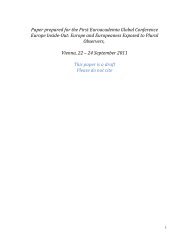Manuel Franzmann The Debate About the Finalité ... - Euroacademia
Manuel Franzmann The Debate About the Finalité ... - Euroacademia
Manuel Franzmann The Debate About the Finalité ... - Euroacademia
Create successful ePaper yourself
Turn your PDF publications into a flip-book with our unique Google optimized e-Paper software.
firm absoluteness: “It is true that <strong>the</strong> citizens will always have closer ties to <strong>the</strong>ir nation state than to <strong>the</strong> European<br />
Union“. But is this a fact written in some sort of book of nature One thing seems clear: without <strong>the</strong> support of strong<br />
intellectual voices, <strong>the</strong> necessary change in <strong>the</strong> perceptions of citizens and in <strong>the</strong> European public will not take place.<br />
<strong>The</strong>refore, <strong>the</strong>re is a danger of a self-fulfilling prophecy in argumentations like <strong>the</strong> one of Habermas. However, <strong>the</strong><br />
main point seems to be that he does not see any need for a European federal state and for a constitution as political<br />
community, nei<strong>the</strong>r now nor in <strong>the</strong> future. This goes hand in hand with a philosophical cosmopolitism and postnationalism<br />
that prematurely regards <strong>the</strong> nation state as obsolete and orientates towards a vague “world society”. 4<br />
<strong>The</strong> current crisis as indecisiveness between “community” and “society”<br />
Let us move on now to <strong>the</strong> current crisis of <strong>the</strong> European Union that, of course, has many aspects, causes and<br />
consequences. Here, our focus has to be on <strong>the</strong> contradictory, hybrid constitution of EU institutions that move between<br />
society and community. In this respect, <strong>the</strong> turning point in <strong>the</strong> history of <strong>the</strong> European Union and in <strong>the</strong> formation of<br />
<strong>the</strong> complex crisis seems to be <strong>the</strong> implementation of <strong>the</strong> economic and monetary union. With it, <strong>the</strong> participating EU<br />
member states in some way crossed a line because <strong>the</strong>y now gave up very important aspects of <strong>the</strong>ir economic<br />
autonomy. <strong>The</strong> current crisis illustrates this particularly regarding <strong>the</strong> monetary policy. In history, states have financed<br />
whole wars with <strong>the</strong>ir monetary policy. <strong>The</strong>y have managed <strong>the</strong>ir national debt; stimulated economic growth; put <strong>the</strong>ir<br />
national economy in an advantageous position in relation to <strong>the</strong> world market through <strong>the</strong> devaluation of <strong>the</strong>ir<br />
currencies. <strong>The</strong> current tragedy of Greece is in part due to <strong>the</strong> lack of its former monetary autonomy. For this reason,<br />
some economists call for a temporary or longer return of Greece to its drachma. <strong>The</strong> main alternative to such an<br />
approach of turning <strong>the</strong> clocks back seems to be moving on and completing <strong>the</strong> political communitisation with a<br />
European federal state. This conclusion is backed by <strong>the</strong> “optimum currency area <strong>the</strong>ory” that has become an<br />
important intellectual resource to analyse <strong>the</strong> current crisis of <strong>the</strong> European Union. According to this <strong>the</strong>ory (Mundell<br />
1961) <strong>the</strong>re are four main characteristics of a currency area that provide stability of <strong>the</strong> currency: homogeneity,<br />
flexibility, mobility and solidarity. <strong>The</strong> Eurozone clearly falls short in all four compared to <strong>the</strong> Dollar zone of <strong>the</strong><br />
USA. <strong>The</strong> Belgian philosopher and economist Philippe Van Parijs has very convincingly argued (Van Parijs 2012)<br />
that <strong>the</strong> most realistic prospect for advancement in stabilizing <strong>the</strong> Eurozone is <strong>the</strong> construction of an effective<br />
infrastructure of solidarity. But how to build such an infrastructure without <strong>the</strong> constitution of a European political<br />
community<br />
Conclusion<br />
Let me conclude this presentation with a short summary. With <strong>the</strong> economic and monetary union, <strong>the</strong> participating<br />
member states put <strong>the</strong>mselves in <strong>the</strong> same boat on such a large scale that <strong>the</strong> resulting consequences begin to burst <strong>the</strong><br />
limits and rock <strong>the</strong> entire boat, causing comprehensive problems. For this reason, you can say that all citizens of <strong>the</strong><br />
EU already form an actual “community of consequences”. However, <strong>the</strong>y still do not see and constitute <strong>the</strong>mselves as<br />
a “political community” along <strong>the</strong> standards of <strong>the</strong> fully developed model of <strong>the</strong> nation state, which would allow<br />
acting as a community in a democratically legitimized way and with a built in infrastructure of solidarity. To this day,<br />
<strong>the</strong> political institutions of <strong>the</strong> EU remain limited or “societal” in <strong>the</strong>ir framework to deal with <strong>the</strong>se far-reaching<br />
consequences.<br />
Information about <strong>the</strong> author see: www.manuelfranzmann.de<br />
References:<br />
Habermas, rgen. 2012. “<strong>The</strong> European Citizen: Just a Myth” Interview by Francis Fukuyama. Global. <strong>The</strong> Global<br />
Journal. http://<strong>the</strong>globaljournal.net/article/view/695/<br />
Mundell, Robert A. 1961. “A <strong>The</strong>ory of Optimum Currency Areas.” American Economic Review 51 (4): 657–665.<br />
Oevermann, Ulrich. 2000. “<strong>The</strong> Analytical Difference Between Community and Society and Its Consequences.<br />
Keynote Address.” In Developing Identities in Europe. Citizenship Education and Higher Education, ed.<br />
Alistair Ross, 37–61. London: CiCe.<br />
Tönnies, Ferdinand. 1887. Gemeinschaft und Gesellschaft, Leipzig: Fues's Verlag.<br />
Tönnies, Ferdinand. 1957. Community & society, East Lansing: Michigan State University Press.<br />
Van Parijs, Philippe. 2012. “No Eurozone without Euro-dividend”. Unpublished, provisional manuscript.<br />
4











